Kidney Transplant in Iran all you need to know
Kidneys are two bean-shaped organs located on each side of the spine just below the rib cage. Each kidney is the size of a fist.
Their main task is to filter and remove waste materials, toxins, minerals and liquids from the blood by producing urine.
When the kidneys don’t work well, it affects the body’s vital functions, causing problems with the heart, lungs, and bones.
When the kidneys lose their ability to filter, dangerous amounts of fluid and waste accumulate in the body, leading to high blood pressure and eventually kidney failure.
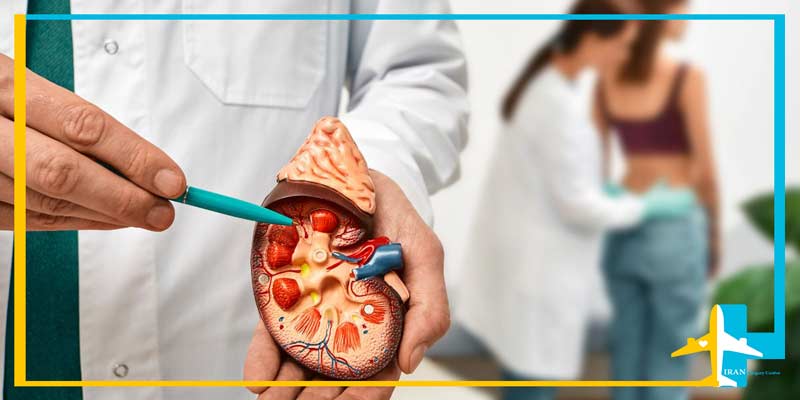
End-stage kidney disease occurs when the kidneys lose about 90% of their normal function.
People with end-stage kidney disease need to have waste removed from their bloodstream through dialysis or a kidney transplant to survive.
A kidney transplant is actually a surgical procedure to place a healthy kidney from a living or deceased donor into the body of a person whose kidneys are not working properly.
Diseases that can lead to kidney transplant or dialysis include:
- Diabetes and high blood pressure, which are two of the main causes of kidney diseases.
- Damage to nephrons (small purifying parts) due to injury
- Frequent urinary infections
- Obstruction in the kidney and urinary system
- Diseases such as polycystic kidney, or other congenital kidney disorders, hemolytic uremic syndrome, chronic glomerulonephritis, lupus, and other immune system diseases
- Kidney diseases slowly destroy nephrons. As the damage progresses in both kidneys, they show themselves after years and even decades.
Advantages of kidney transplant over dialysis:
- Better quality of life
- Lower risk of death
- Fewer dietary restrictions
- Lower treatment cost
- Getting rid of the side effects of dialysis, including nausea, vomiting, blood pressure reduction, muscle cramps, and skin itching.
Circumstances in which a kidney transplant may not be the right solution for you include:
- Old age
- Severe heart disease
- Active or recently treated cancer
- Mental illness that is not well controlled
- Alcohol or drug use
- Any other factor that affects the safety of the surgical process and the use of drugs required after transplantation and is an effective factor in the rejection of a transplanted kidney.
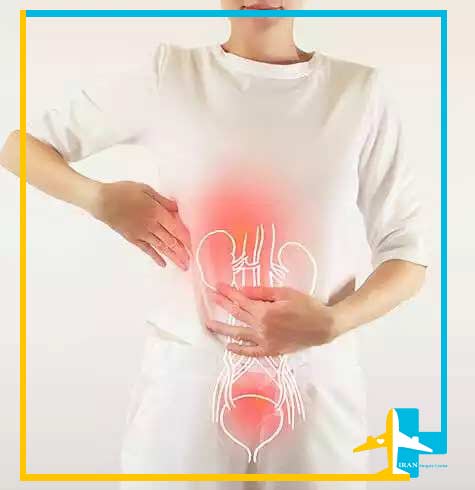
Kidney donor
Healthy people who wish to help a loved one can be considered as a kidney donor.
Donor criteria for living kidney donors include being over 25 years of age, close relatives up to the 4th degree or approved by the ethical committee, having healthy kidney function and being in good health.
In the best case, the donor and recipient have a compatible tissue type and blood type.
However, today there are effective solutions for successful transplantation from a living person, even if the donor is not compatible.
Sometimes the recipient-donor couple may be paired with another, and the donated kidneys can be exchanged. This operation is called paired donation or cross transplant. Paired donation ensures that each recipient receives a matching kidney.
In Iran, international patients can only apply for kidney transplants from living donors. These patients must have a donor from their own country who is willing to donate the organ free of charge.
In the Iran surgery center, careful pre-operative evaluation makes live donation a safe method, and if there is a risk to his health in the future, the donor is not allowed to donate.
Benefits of receiving a kidney from a living person
Better result: Patients who need a kidney transplant receive better results by receiving it from a living donor than by receiving a kidney from a deceased person.
In most cases, a kidney received from a living person has a longer lifespan than a kidney from a dead body. Also, the genetic compatibility between the living donor and the recipient patient reduces the risk of organ rejection.
Immediate effect: The effect of organ transplantation from a living donor happens very quickly, so that the patient will immediately feel the effect on his health after the surgery.
Urine production in a kidney transplant from a non-living person may take longer. You may need to continue dialysis until urine output returns to normal.
Time flexibility: The kidney transplant operation can be done at any time convenient for the donor and the recipient, so the necessary planning can be done easily.
No need for waiting time: donor kidney surgery (donor nephronectomy) and kidney transplant happen to you in one day. Patients who find their living donor will not need to wait in the organ donation queue.
To receive an organ from a deceased person, you usually have to wait a long time (sometimes several years).
More opportunities for people on the waiting list to receive an organ: By receiving a kidney from a living person, you do not need to register on the waiting list, thereby increasing the chances of people on the list who are unable to find a living donor.
Evaluation process before kidney transplant
The review process may take several days and includes the following:
- A complete physical examination
- Imaging studies such as X-ray, MRI or CT scans
- blood test
- Psychological assessment
- Any other necessary tests determined by your doctor based on your condition.
After the evaluation, the transplant team will share the results with you and tell you if you have been accepted as a kidney transplant candidate. Each transplant center has its own eligibility criteria. If you are not accepted in a transplant center, you can apply for other centers.

Measures before kidney transplant surgery
1- Find a compatible member
A kidney donor can be living or deceased, compatible or incompatible with you. The transplant team considers several factors when evaluating whether a donor kidney will be a good fit for you.
blood type
It is preferable to receive a kidney from a donor whose blood group is compatible with the recipient of the transplant. Blood group incompatible transplants are also possible, but require additional medical treatment before and after the transplant to reduce the risk of rejection. has a member These cases are known as ABO-incompatible kidney transplants.
Tissue group
If the blood group is compatible, the next step is a tissue group test called the human leukocyte antigen (HLA) group. This test compares genetic markers that increase the likelihood of kidney survival in a transplant. A good adaptation means that the body is less likely to reject the organ. The success rate among twins has been reported to be more than 90%, which can be considered due to the high similarity between these antigens.
compatibility
The third and final matching involves mixing a small sample of the kidney recipient’s blood with the donor’s blood in the laboratory. This test determines whether the antibodies in the blood react against specific antigens in the donor’s blood.
Transplantation is possible in all three cases of incompatibility, but additional medical treatment is needed before and after transplantation to reduce the risk of antibodies reacting to the donor organ.
Other factors that the transplant team may consider in finding the best kidney donor for you include age, kidney size, and exposure to infection.
In order to prepare for the operation, if the patient was dialyzed, he/she will also be dialyzed before the operation.
For a planned live transplant, you must fast for 8 hours before the procedure, usually after midnight.
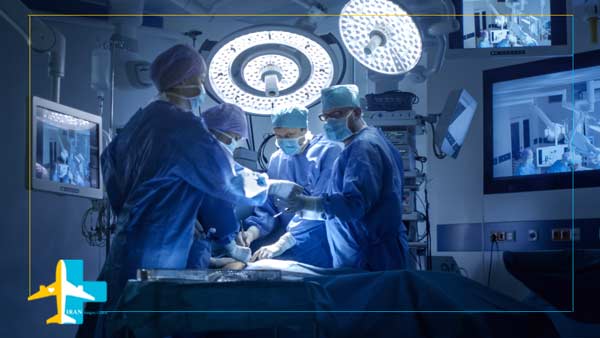
How to Perform a Kidney Transplant
A kidney transplant usually takes 3 hours, but may last up to 5 hours.
Before the operation, some of the previous evaluations and tests will be quickly repeated on the kidney recipient to ensure that no new medical conditions have arisen.
If the match between the donor and the recipient kidney is confirmed, the patient will be put under general anesthesia and transferred to the operating room.
Kidney transplantation is performed under general anesthesia, the surgical team monitors heart rate, blood pressure, and blood oxygen levels during the procedure.
Usually, surgery will be performed simultaneously on the kidney recipient and donor. One of the surgeons performs “nephrectomy” or kidney removal, and the other surgeon prepares the patient to receive a donated kidney. Sometimes, both of these operations are performed by one surgeon.
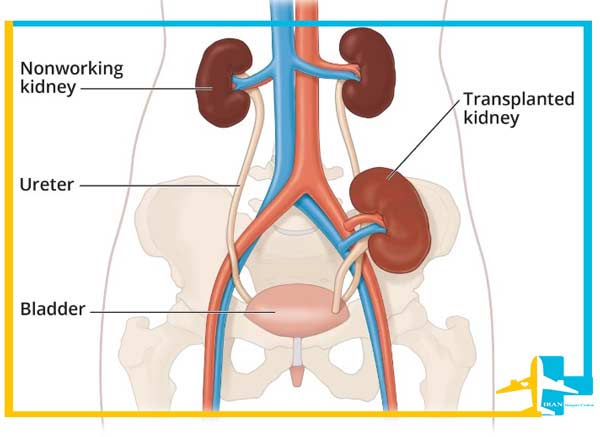
For a kidney donor, during laparoscopic nephrectomy with a living donor, two or three very small incisions (ports) about 5 to 12 mm in size are used to insert laparoscopic equipment. A slightly larger incision of 5 to 7 cm is made above or below the navel to remove the kidney.
For a kidney recipient, the surgeon makes an incision in the lower part of one side of the abdomen and places the new kidney in the lower abdomen on the front side of the body.
If the previous kidney does not cause complications such as high blood pressure, kidney stones, pain, infection, or cancerous tissue, it is left in place.
If the donated kidney is on the left side of the body, it is placed on the right side of the patient’s body, and if the kidney is on the right side, it is transplanted on the left side of the patient’s body; The reason for this issue is the easier connection of the urethra to the bladder.
In the donated kidney, the renal artery and vein are connected to the external artery and vein. Then the blood flow passing through them is checked to identify and prevent any bleeding from the suture area.
At this stage, the mesena (the tube that carries urine out of the kidney) of the donated kidney is connected to the patient’s bladder.
A small plastic tube called a stent may be placed inside the urethra to help urine flow in the early stages. This tube is usually removed about 6 to 12 weeks after surgery, during a minor procedure called cystoscopy.
The surgical site is stitched together by a stapler or suture.
To prevent swelling of the wound area, a drain may be placed in that area.
In the last step, a sterile bandage is placed on the patient’s wound and carefully bandaged.
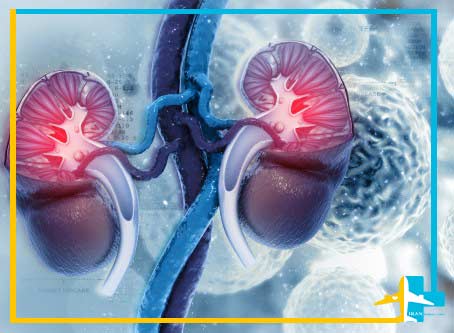
After kidney transplant
The life of patients after a kidney transplant is considered very normal, just like the life before the occurrence of kidney failure. After a successful kidney transplant, the recipient does not need dialysis, does not have significant food restrictions, and psychologically feels in a good general condition.
However, these patients must follow rules to maintain the health of the transplanted organ. An active life, healthy habits and a low-salt, low-fat diet are recommended for life. Immunosuppressants should be taken daily as prescribed.
The most common reason for organ rejection is the irregular use of anti-rejection drugs.
Kidney transplant rejection symptoms are often mild. Therefore, regular tests and examinations are necessary. In most cases, experienced doctors can manage organ rejection.
After the surgery, you will be taken to the recovery room. Once your blood pressure, pulse, and breathing have stabilized and you are conscious, you may be transferred to the intensive care unit (ICU) for close monitoring. Over time, as you recover, you will be transferred from the ICU to the ward. Doctors and nurses will monitor your condition in the transplant recovery unit of the hospital to watch for symptoms and complications.
A urinary catheter is connected to your bladder that drains urine from your body. To make sure the new kidney is working properly, your doctor will also check your urine output.
As long as you are able to eat and drink on your own, nutrients are given to you through an IV line.
You will slowly move from liquids to more solid foods if tolerated. Your fluids may be restricted until the new kidney is fully functional.
Over time, your nutrition will slowly move from liquids to solid and regular foods; But in general, in terms of nutrition, until your new kidney does its full work in your body, you will have restrictions, and in this case you should act according to the doctor’s advice.
As your new kidney heals, it will produce urine just like your own kidneys. This often begins immediately after surgery.
A blood sample is often taken to check the condition of the new kidney, as well as other body functions such as the liver, lungs, and blood system.
You may feel pain and burning at the cut and stitch site.
Under normal conditions, you should start moving the day after the operation. You should move several times a day.
To check the condition of the new kidney, a blood test is usually taken, and the function of other body organs, including the liver, lungs, and circulatory system, are also checked.
As the improvement continues, examinations are done regularly. After leaving the hospital, close monitoring is needed for several weeks to check how the new kidney is working and to make sure the body does not reject it.
Blood tests may be needed several times a week to check the effectiveness of anti-transplant rejection drugs or immunosuppressive drugs that prevent rejection of the transplanted organ.
Medicines may need to be changed in the weeks after the transplant according to the results of the tests.
The use of drugs should continue until the end of life. However, with the passage of time, the number of these visits will decrease and after a year, provided that the patient does not have a serious problem, he will only have to attend the treatment center once every 3 to 6 months.
Other post-transplant medications help reduce the risk of other complications, such as infection.
It is important to take all medications as prescribed by your doctor. Because even if they stop their medication for a short time. The body may reject the new kidney. Contact your transplant team immediately if side effects occur.
Under any circumstances, take only the drugs recommended by doctors, use pain relievers, be careful not to use aspirin or pain relievers that increase the possibility of bleeding.
When your vital signs are stable, your new kidney is working and you don’t need ongoing hospital care, and you’ll be ready to go home.
When you are at home, it is important to keep the surgical area clean and dry.
Usually, the surgical site should not come into contact with water until the skin heals, as this increases the risk of infection. Surgical stitches or staples are removed during the next office visit.
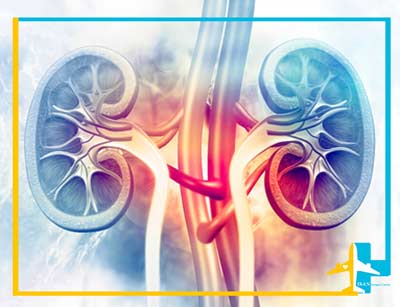
Until the wound has healed (usually about six weeks after surgery) avoid any activity or position that puts pressure on the new kidney, including lifting objects over 4.5 kg (10 pounds), exercise except walking, wearing tight belts , driving, etc. is not allowed.
Check your blood pressure and weight every day at home. An increase in these may mean that your kidneys are not filtering fluids properly and you should be seen by your transplant team quickly. Other important symptoms include:
Fever and kidney sensitivity are the most common symptoms of kidney failure and infection.
Redness, swelling, or bleeding or other discharge from the incision site
Increased pain around the incision site, which may be a sign of rejection or infection.
Rejection symptoms may mimic other medical conditions or problems. Discuss any concerns with your transplant team. Frequent visits and contact with the transplant team are vital.
Avoid places where you may be exposed to sick people. Observance of environmental hygiene and personal hygiene is very important.
Frequent hand washing is very important to prevent possible infections.
This is because your immune system is suppressed to protect it from rejecting the new kidney. This will be a lifelong precaution.
If you are active, you will recover faster. Your doctor will tell you what exercises are safe to do and how long you can do them. Start by walking and stretching.
However, defensive sports, such as football, are prohibited because they can damage the donated kidney.
Due to the increased sensitivity of the skin to sunlight as a result of the use of transplanted drugs, it is better not to be exposed to direct sunlight, and if you have to be exposed to the sun, you can use a hat with a mask and be sure to wear sunscreen.
After transplantation, skin examinations are performed with a dermatologist to prevent skin cancer. Also, up-to-date screening is strongly recommended for other cancers as well.
Many patients find a better appetite after kidney transplant and gain weight unintentionally; Avoid weight gain, because the amount of some medicines is calculated based on your weight, and with weight gain, they must be used in a larger amount, which will definitely lead to more side effects.
When you are taking corticosteroids, consuming large amounts of carbohydrates is problematic for your body and can lead to high blood sugar and diabetes.
After a kidney transplant, female patients should have a pap smear test (to detect cervical cancer) once a year, because immunosuppressant drugs increase the risk of some types of cancer.
Your medical team may give you other post-operative instructions depending on your condition.
In the Iranian surgery center, the donor is usually hospitalized for two days. And the kidney recipient can usually be discharged from the hospital after 5 days.
Most kidney transplant recipients in Iran’s surgery center can return to their work and normal activities within eight weeks after the transplant.
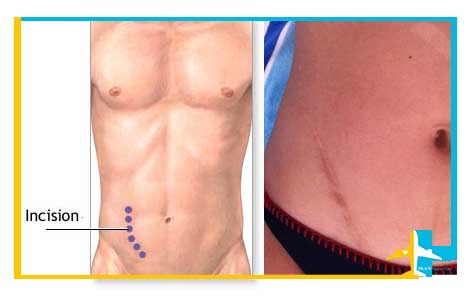
Possible complications and risks of kidney transplant
Although a kidney transplant can treat advanced kidney disease and kidney failure, it is not a complete cure. Some forms of kidney disease may return after a transplant.
The risks associated with a kidney transplant include three things:
- Direct risks of surgery itself
- The dangers of rejecting a donated organ transplant
- Side effects of taking antirejection drugs
- Complications of kidney surgery
- Blood clots and bleeding
- Infection
- Failure or rejection of a donated kidney transplant
- Infection or cancer that can be transmitted with a donated kidney.
- Death, heart attack and stroke
- Obstruction of new renal blood vessels
- Urinary incontinence or obstruction or leakage of urine in the urethra
- Lack of function of the new kidney at first
- Reaction to anesthesia
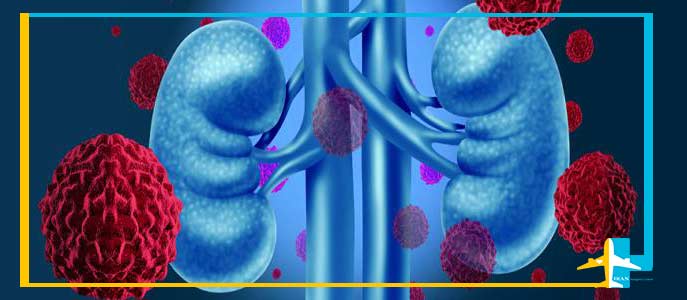
- Side effects of anti-transplant rejection drugs
After a kidney transplant, you take immunosuppressants to suppress your immune system to prevent your body from rejecting the donated kidney transplant and to keep the transplanted kidney in your body alive.
You should take these medicines for the rest of your life.
These drugs, which prevent the body’s defense system from attacking the new organ, can cause a different reaction in each person. Among these side effects, the following can be mentioned:
Bone thinning and bone damage (osteoporosis)
- Diabetes
- Excessive hair growth or hair loss
- High blood pressure
- High cholesterol
- Increased risk of cancer, especially skin cancer and lymphoma.
- Infection
- Swelling
- Weight Gain
- Acne
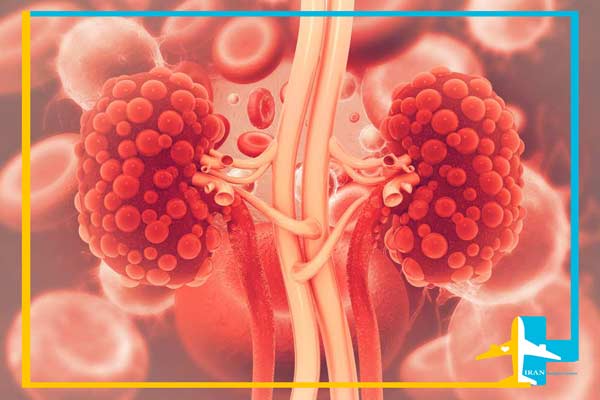
Deciding whether to have a kidney transplant for you is a personal decision that requires careful consideration and consideration of the risks and benefits.
Renal transplant rejection
If the body does not accept the new organ or transplant rejection happens, nothing can be done and the patient has to undergo dialysis again. After performing any type of organ transplant, three types of rejection may occur, which include the following:
- Super acute rejection: usually has a profound effect. This rejection happens at the moment of transplantation or a few hours after the operation.
- Acute rejection: This type of rejection is more common and suppressive drugs are usually prescribed to prevent this type of rejection. This rejection may happen a day or a few weeks after the operation.
- Chronic rejection: this type of rejection occurs without any signs and symptoms about a year after the transplant. The cause of this type of rejection is unknown, but acute rejection is a strong predictor of chronic rejection.
Symptoms of transplant rejection
- Fever
- Cough
- Vomit
- nausea
- Pain, especially when urinating
- less urine production than usual
- Always keep in mind the signs and symptoms of kidney failure, including decreased urination, swelling, fever, increased blood pressure, weight gain, and the feeling of stiffness of the transplanted kidney.
If you notice any of these symptoms, you should contact your doctor immediately.
Because anti-rejection drugs affect your immune system, you’ll be at greater risk for infection. A balance must be struck between preventing rejection and making you more susceptible to infection.
Some of the infections that you are particularly at risk for include: oral thrush (thrush), herpes, and respiratory viruses.

Children’s kidney transplant
Babies and children of any age may need a kidney transplant. In pediatric patients, the most common causes of kidney failure are congenital anomalies and genetic conditions.
Chronic kidney failure is a very insidious disease, and especially in the early stages, it may not have any symptoms. In children with rapidly progressive renal failure, the amount of urine decreases, paleness, weakness, loss of appetite, vomiting, swelling of the face and legs, and shortness of breath occur. Chronic kidney failure is one of the most important causes of growth delay in children.
The first year after transplantation is very important. Children who spend a healthy year after a kidney transplant develop like adults. And they can continue their school and sports.
For kidney transplant to children, we do not need to receive a kidney from a child’s kidney donor. Your child can also be transplanted with adult kidneys. In particular, when adult kidneys are transplanted into infants, very successful results are obtained compared to children’s kidneys
Iran Surgery Center has extensive experience with kidney patients of infants and children, including complex cases and liver transplant and kidney surgeries. The percentage of success or survival of the patient after the transplantation of the Iran surgery center in kidney transplantation for children is 100%.
Kidney transplant success rate
The success rate of a kidney transplant will depend on various issues such as whether the donor is alive or dead, as well as the recipient’s medical condition.
A kidney taken from a living person will usually last longer. If the donor is a first-degree relative (sister, brother, or parent), the probability of transplant acceptance is higher, but in some cases, distant relatives are also accepted.
Most conditions that lead to kidney loss are due to transplant rejection, but infection, circulation problems, cancer, and the return of the original kidney disease can also be conditions that lead to kidney loss.
Kidney transplants are generally very successful in extending the lives of people who qualify. Kidney transplant success rate in the world, up to 97% of transplanted kidneys survive at least 1 year.
In 2020, a woman living in France celebrated 50 years of active life after receiving a kidney transplant. A man who underwent a transplant in 1971 is believed to be one of the longest-running kidney transplants in the UK. Another man was transplanted in June 1977.
These are all links from years ago. Today, surgical techniques and immunosuppressive drugs have become much more sophisticated, and kidney recipients can expect better results.
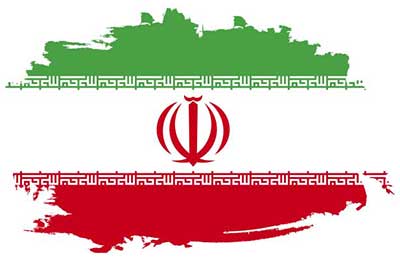
Kidney transplant success rate in Iran
Kidney transplant outcomes have improved dramatically over the past decades. Advances in surgical techniques, improved understanding of the immune system and immunosuppressive regimens, and better antimicrobial treatment options contribute to kidney transplant survival rates. However, kidney transplantation is still a highly specialized medical intervention.
The success rate depends largely on the medical center and the team responsible for the operation and long-term follow-up.
The survival rate of kidney transplant in Iran, after the first year is 99% and in the fifth year is 94%.
The number of kidney transplant surgery in Iran is 24 cases per one million people, which is 1 to 5 cases in developing countries and 20 to 40 cases in developed countries.
The main reason for the high number of kidney transplants in Iran is the permissibility of living kidney transplants, which includes 80% of people, while it is not allowed in many other countries.
Many patients from all over the world prefer Iran for kidney transplant because of the great experience, affordable cost and high success rate of transplant centers.
Reasons for choosing Iran surgery center for kidney transplant?
Our kidney transplant surgeons perform more than 500 surgeries annually, with a success rate of 99%, which is higher than the global average.
Among the advantages of the kidney transplant center in the Iran surgery center, the following can be mentioned:
Advanced surgical techniques: Minimally invasive and laparoscopic surgery increases the ease of surgery, shorter and easier recovery period, reduces the risk of infection and provides better results.
The possibility of paired kidney donation and cross transplants: Transplants where there is a kidney exchange between couples with greater compatibility are frequently performed in Iran kidney transplant center with excellent results.
Kidney transplantation of infants and children. Our transplant team has extensive expertise in pediatric kidney transplants.
Use of advanced technology: Advanced equipment is available in operating rooms, intensive care units, and laboratory facilities.
We will be with you at all stages from the moment you arrive at the airport to the moment you leave, and we will provide all the necessary measures for complete comfort in Iran, including hotel, transfer, translator, SIM card, etc.
Special care for international patients: From the first contact to post-operative examinations, patients coming from abroad are guided and supported by our international patient center to ensure that they feel comfortable and at every stage of the kidney transplant process. they relax Our services will cover all your needs, even the smallest of your needs.

















Leave A Comment